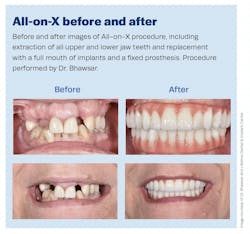The expanded value of restorative dentistry: Impacts on mental health and quality of life
Dental restoration produces positive outcomes that are clear to see in the smiles of satisfied individuals. The transformative nature of restoring damaged or missing teeth, however, goes far beyond esthetics for these individuals—it can have profound psychological and social benefits on individuals and significantly improve their overall quality of life.
In addition to aiding digestion, teeth are integral to human interaction, communication, and self-expression. Unfortunately, interpersonal relations are hurt by the presence of discolored, missing, or broken teeth in a significant portion of the population. According to a 2024 Centers for Disease Control and Prevention (CDC) report on oral health,1 edentulism was present in 1.2% of adults aged 35-49; 5.9% aged 50-64; 11.4% aged 65-74; and 19.7% aged 75 or older. Also, more than one in 10 adults aged 65-74 and nearly one in five aged 75 or older had lost all their teeth. These conditions can have profound psychological and social effects on people of all ages. With so many individuals suffering, dentists can play a key role in battling mental health and improving their patients’ overall quality of life.
Poor dental health and its impact on quality of life
Studies show a correlation between missing, misaligned, unesthetic teeth, and mental health.2 These conditions may dramatically alter patients’ appearance, making them overly conscious of how others perceive them. This affects mental health in the form of depression,3 high levels of stress, and social anxiety.
While individuals of all ages experience these dental conditions, children tend to be bullied by fellow students at school because of their teeth and appearance. This can cause them to have low self-esteem, be self-conscious, and lack confidence. As a result, these children avoid social interactions and become lonely and isolated,4 which is detrimental to their mental health5 and quality of life.
Tooth loss impacts adults, both personally and professionally. Issues such as chewing or speaking can hinder social interactions due to embarrassment and lead to avoidance of gatherings. This limits opportunities for close relationships and often lowers self-esteem. In the workplace, self-consciousness due to poor dental health reduces confidence, which can affect communication, presentations, and career growth.
Other evidence of how poor dental health can impact quality of life includes:
Systemic health: Some patients experience systemic problems due to their dental health, such as diabetes,6 cardiovascular disease,7 poor digestion, and malnutrition.
Cortisol production: Chronic stress caused by tooth loss can lead to excess production of cortisol, which ultimately affects memory, depletes concentration, impacts emotional regulation, and contributes to anxiety and depression.3
Hormonal changes: Social interactions and bonding activities release oxytocin and endorphins, hormones that promote feelings of happiness and relaxation. Tooth loss can cause social withdrawal due to embarrassment, reducing the release of these hormones and thus increasing loneliness and sadness.8
The physiological impact of tooth loss extends far beyond oral health, affecting brain function, stress hormones, and emotional regulation. By addressing tooth loss through restorative treatments, individuals can mitigate these physiological effects, thus improving their mental and physical health.
Available restorative treatments
Multiple restorative treatments are available for broken, missing, discolored, and misaligned teeth. Treatment modalities include crowns, bridges, veneers, implants, complete or partial dentures, full-mouth reconstruction with root form, remote anchorage implants, and orthodontics. These restorative procedures give a life-changing experience to the individuals by increasing confidence, the courage to rebuild social connections, and the overall quality of life. With recent advancements, some of these procedures can be performed in a day.
While a number of dental issues are relatively minor, such as nonpainful caries that require a simple filling, some patients may not understand the long-term impact of foregoing restorative treatment. In these situations, dentists are critical in educating patients to understand the benefits of acting sooner rather than later and avoiding a more significant problem in the future—and the subsequent effects on their quality of life.
Restorative treatments improve quality of life
After treatment with these restorative options, many patients see changes in their overall well-being. This includes, but is not limited to:
Improved esthetics: Facial structure and harmony are restored, and patients can confidently smile again.
Improved speech: Proper articulation and harmonious functioning of the teeth, lips, and tongue are essential for speech.
Greater self-confidence: Patients with renewed smiles are no longer self-conscious about their teeth, which gives them more courage and confidence in social situations.
Improved professional and social lives: Better communication, confidence, and improved self-esteem can result in opportunities for advancement and increased job satisfaction and help rebuild social connections.
Better nutrition: Due to restored teeth, patients no longer need to limit dietary choices, which helps improve their overall nutrition and health. This eliminates the stress associated with social occasions such as going to restaurants and holiday dinners.
Reduced anxiety and stress: Studies show that people who smile more experience reduced cortisol and stress.9
Happy patients increase the bottom line
When restorative treatments significantly improve a patient’s quality of life, the benefits extend beyond the individual to the success and growth of the dental practice. By offering advanced restorative services, practices attract patients in need of solutions for complex dental issues, which positions the practice as a trusted provider of comprehensive care. In addition to generating greater revenue per patient, high-value procedures such as crowns, bridges, and implants build ongoing relationships as satisfied patients return for ongoing maintenance and care. By enhancing functionality and esthetics, restorative dentistry increases patient satisfaction, improves oral health, and encourages word-of-mouth referrals. Patient testimonials and success stories are powerful marketing tools, elevating the practice’s reputation and positioning it as a leader in restorative dentistry, ultimately driving long-term business success.
Editor's note: This article appeared in the May 2025 print edition of Dental Economics magazine. Dentists in North America are eligible for a complimentary print subscription. Sign up here.
References
- 2024 Oral Health Surveillance Report: selected findings. Centers for Disease Control and Prevention. October 9, 2024. https://www.cdc.gov/oral-health/php/2024-oral-health-surveillance-report/selected-findings.html
- Matsuyama Y, Jürges H, Dewey M, Listl S. Causal effect of tooth loss on depression: evidence from a population-wide natural experiment in the USA. Epidemiol Psychiatr Sci. 2021;30:e38. doi:10.1017/S2045796021000287
- Hao Y, Yuan Z, Zhu Y, et al. Association between tooth loss and depression mediated by lifestyle and inflammation - a cross-sectional investigation. BMC Public Health. 2024;24(1):2627. doi:10.1186/s12889-024-20065-z
- Broutin A, Blanchet I, Canceill T, Noirrit-Esclassan E. Association between dentofacial features and bullying from childhood to adulthood: a systematic review. Children (Basel). 2023;10(6):934. doi:10.3390/children10060934
- Brandt L, Liu S, Heim C, Heinz A. The effects of social isolation stress and discrimination on mental health. Transl Psychiatry. 2022;12(1):398.
- Ghanem AS, Nagy AC. Oral health’s role in diabetes risk: a cross-sectional study with sociodemographic and lifestyle insights. Front Endocrinol (Lausanne). 2024;15:1342783. doi:10.3389/fendo.2024.1342783
- Hopkins S, Gajagowni S, Qadeer Y, et al. More than just teeth: how oral health can affect the heart. Am Heart J Plus. 2024;43:100407. doi:10.1016/j.ahjo.2024.100407
- Veiga L, Carolino E, Santos I, et al. Depressive symptomatology, temperament and oxytocin serum levels in a sample of healthy female university students. BMC Psychol. 2022;10:36. doi:10.1186/s40359-022-00744-5
- Cross MP, Acevedo AM, Leger KA, Pressman SD. How and why could smiling influence physical health? A conceptual review. Health Psychol Rev. 2023;17(2):321-343. doi:10.1080/17437199.2022.2052740
About the Author

Aditya Bhawsar, BDS, MDS, AFAAID
Aditya Bhawsar, BDS, MDS, AFAAID, is an associate dentist at Lifetime Dental & Implant Center, in Katy, Texas, and A Dental Care in Houston, Texas. He specializes in the management of multidisciplinary complex cases. He is a regular presenter at local, national, and international dental industry events. Dr. Bhawsar graduated with a certificate in prosthodontics and a master’s in dental science at Rutgers School of Dental Medicine, followed by a fellowship in implant dentistry at the Loma Linda School of Dentistry. Connect with Dr. Bhawsar on LinkedIn or at [email protected].



